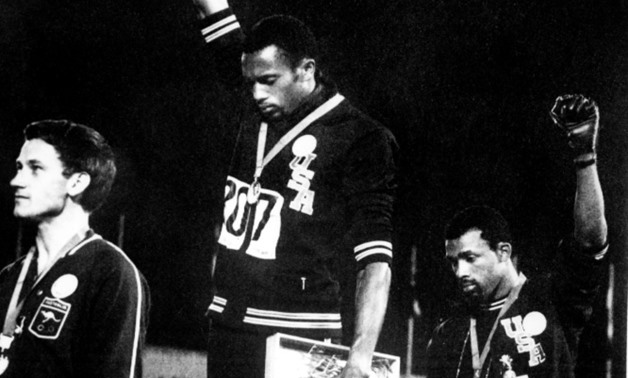
US athletes Tommie Smith (C) and John Carlos (R) raise their gloved fists in the Black Power salute against racism during their national anthem, after receiving their first and third place medals in the men's 200m event at the 1968 Mexico Olympics
EPU/AF
Former Olympic athletes lit a commemorative cauldron Friday to mark the 50th anniversary of the 1968 Games in Mexico City, a symbol of a worldwide year of turbulent times.
At a moment of revolt and upheaval, the Mexico City Olympics brought the worlds of sport and politics crashing together -- and broadcast the collision live around the globe on color television for the first time.
It was the year that Martin Luther King Jr. and Robert F. Kennedy were assassinated. A year of student protests that exploded in Berlin and Paris and spread around the world. The year the US began to truly question the Vietnam War, and the USSR crushed the Prague Spring in Czechoslovakia.
At the Olympics, it was the year of George Foreman, Mark Spitz, Dick Fosbury and his "Fosbury Flop," Bob Beamon's "Leap of the Century," Tommie Smith and John Carlos with their iconic Black Power salute -- and so many more.
Fosbury and Beamon returned to the Olympic stadium Friday to take part as veterans of the 1968 Games marched in formation to form the Olympic rings.
Mexican sprinter Enriqueta Basilio, the first woman to light the Olympic cauldron, then symbolically re-lit the flame to a burst of applause.
The man who organized the opening ceremony, Luis Armida, recalled the moment five decades ago when Basilio did the same.
"This tall, slim girl appeared. She wasn't running, she was flying. Every step looked like a gazelle's," he told AFP.
Now aged 70, Basilio -- like all the athletes -- was a bit less gazelle-like, but gamely waited atop the steps leading to the cauldron as a succession of torch-bearers passed the flame up to her.

- Fraught memories -
The anniversary has brought fraught memories for Mexico, where the winds of change were also blowing in 1968.
At the time, capitalizing on the international attention brought by Latin America's first Games, Mexican students took to the streets to call for democracy after four decades of one-party rule.
On the night of October 2, 10 days before the opening ceremony, army troops opened fire on 8,000 peaceful demonstrators in Mexico City, killing between 300 and 500 people.
- Powerful platform -
Hushed up by the Mexican government, the massacre is little-remembered abroad.
But it was certainly noticed by the generation of young, politicized athletes making their way to Mexico City.
Smith and Carlos cite it as one of the influences for their defiant protest atop the podium on October 16, 1968, after Smith won gold in the men's 200m -- becoming the first person to run the race in under 20 seconds -- as Carlos claimed bronze.
On the podium, the African American athletes thrust their black-gloved fists into the air as the national anthem played, a defiant protest against racism in the United States and human rights violations worldwide.
"I came to Mexico City to make a statement. Not to win medals," Carlos said recently after returning to the stadium.

- Records shattered -
Other protests included that by Czechoslovakian gymnast Vera Caslavska, who won silver in the floor exercise and defiantly bowed her head as the Soviet anthem played for gold medalist Larisa Petrik -- recalling how Moscow's tanks had crushed her country's nascent opening.
But the Games were also stunning as pure sport.
Mexico City's high altitude -- 2,300 meters (7,545 feet) -- led to scores of broken records in the thin air: 30 world records and 76 Olympic records.
The most impressive may be American Beamon's 8.9-meter long jump -- still an Olympic record.
Or perhaps it was his compatriot Fosbury's 2.24-meter high jump, using the "backward" technique that was mocked at the time -- but revolutionized the sport.
"When I discovered this new way to go backwards, I could jump higher and I could be a better competitor," Fosbury told AFP.
"I didn't know that any other jumpers could use it, but here in Mexico City 50 years ago, I showed it to the world and today it's universal."



Comments
Leave a Comment